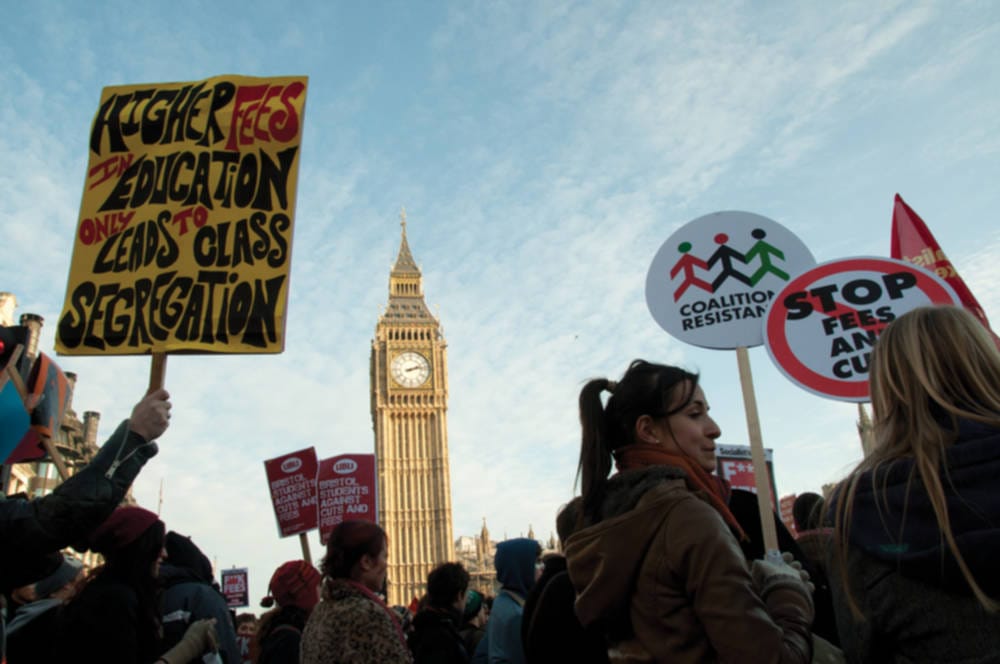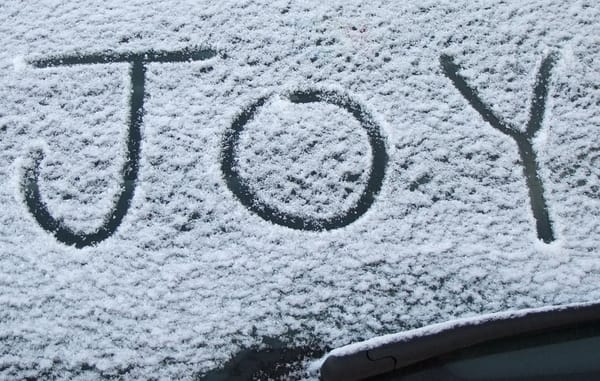We weren't allowed to protest freely
The kettling was horrible, unjustified and counter-productive

On Thursday the 9th of December MPs voted to raise the tuition fee cap to £9000. Unsurprisingly this brought out thousands of students to protest the changes. I had been at the previous protests and while I had only been kettled once momentarily, I went with the expectation that the police were going to kettle us. I took warm clothes, water and I pulled an all-nighter the night before to finish an essay so I was able to submit it before I went on the protest. Isn’t that sad? Sad that I wanted to peacefully protest in Parliament Square and had to prepare for the police to surround the protest and keep it there for hours.
Metal barriers on Parliament Square itself had been pulled down and we walked onto the square proper, Parliament Square has always been the obvious location for a protest against something occurring in Parliament. It is the place to let MPs in Parliament hear your anger. There has been much coverage of the violence that occurred, and while I was in the crowd that was charged by mounted police, the protest was largely tame with only ever one corner seeing any violent behaviour. Most of the time passed largely with nothing much happening, although we heard talk that on Whitehall, protesters were taking a beating from police. At 4pm as we attempted to go to the NUS vigil on embankment, we realised we were being kettled. It would be another 5 hours until I left the square and 2 after that that I would be allowed out of the kettle that ended up on Westminster bridge.
For hours very little happened and we stood by a fire to warm our feet. Occasionally the helicopters would shine the light on us. At 6 we were largely bored, the vote had been passed, as it was predicted, but by only 20 votes and with the concessions made earlier in the week on part-time students and the threshold of starting repayments, I’d argue that the student campaigning and protests had had an effect. While I had thought the ‘block bloc’ would be ignited after the announcement, it was obvious that people were more despondent than angry. If the police had let people out at that point, I’m fairly certain people would have filtered out reasonably quickly. With some polite encouragement people would have left and gone home. But the police lines were unmoving.
If had they been free to leave and the police behaved responsibly, [the vandalism] would have been prevented
At around 7 people started trying to smash the windows of the Treasury, a while later concerted efforts were being made to gain access to the building. Only after the doors had been broken open and windows smashed did the police act, while the build up occurred, despite a helicopter shining on the windows and clearly seeing the crowd amass outside the doors, the police did nothing. Had they desired, they certainly had enough officers, they could have swiftly moved and formed a line between the building and the protesters. It appeared they were content to allow the violence to escalate to the point where they had to charge to break up the violence that only occurred after the kettling had begun. To those who think the violence was pre-meditated, I disagree entirely. People had been milling around the HMRC for hours and had sat in its windows and hung banners off it. It was only after several hours of being trapped did their attention turn to the building, if had they been free to leave and the police behaved responsibly, this would have been prevented. The protesters were in three loose groups: one fighting the police, another watching, and another queuing to leave the square, I stood at the side and chanted with the others of the second group.
Why didn’t I join in with the fighting? I was, and still am, angry and in some ways students are right to be taking their anger out in physical ways; the petitions, letter and lobbying amounted to nothing. Under this country’s unfair electoral system, a party pledging to vote against a raise in fees and having a manifesto with paragraphs wanting to abolish them altogether gained 23% of the vote but it only received 8% of the Parliamentary seats. Students have tried a lot of indirect action including making their voices heard at the ballot box, but these voices have been ignored by the institutions meant to the represent them. It is only now that people are starting to take note of what people think about fees and while it is a shame this appears to correlate with the amount of damage being done, I am glad it is getting coverage. I didn’t join because I’m still scared, scared of getting hurt or being arrested and also much better placed in trying to convince people through other means, but I empathise with those at the front. Yes, I think burning of memorial benches and swinging off the Cenotaph is tasteless, but I don’t care that someone kicked a royal car other than these things detract from so much that also occurred on the day, and to hear that “great restraint” being shown in protesters not being shot is outrageous. While I didn’t see Jody McIntyre pulled from his wheelchair or Alfie Meadows being hit so hard that he required brain surgery, I did see police continue to charge and rain their batons down on the heads of the protesters near the front.
More than once it seemed like the hundreds of riot police on the sidelines were about to make a charge for us, but as they slowly manoeuvred from one side of the square things seemed to quiet down. Again the boredom of the kettle set in, and when we saw a group being escorted out we joined them. This was at around 8pm. An hour later and with under 16s, the old and the infirm being prioritised, I had moved forward but a few metres. The crowd was largely grumpy and fed-up, with the odd chant of, “if you think this is illegal clap your hands”. It appeared the kettle was being released one protester at a time, and that each was being searched and photographed. People in the crowd confirmed with each other what is and isn’t allowed to be done by the police but largely we grew increasingly cold and irritated at the situation. The only times that anyone spoke to us was when a single policeman said he thought we shouldn’t be more than an hour, and later another joked that we were being moved into another kettle. At 9pm, the police lined right up to Westminster Bridge and we were allowed to advance, still without knowing what was going on. As we passed Big Ben, for the first time in hours the group showed solidarity and began chanting, but it soon became apparent that we had just become a moving kettle with hundreds of police in front and behind. While I am aware of kettlings legality, I’ve never heard of police forcing people to march in such a way.
What resulted was the entire protest being forced onto the much more exposed Westminster bridge, which had very low barriers and railings. Soon we were crammed in together with barely much room to move. I passed a woman having a panic attack who was trying to be calmed down by her friends and an old man who was in near tears about the treatment, it seemed he had been near to people who had ended up urinating themselves. The entire day there had been no access to water, and while many people had relieved themselves on various buildings or barriers, there had been no sanitation provided, despite the police pledging to do so. While we chanted more, there was relatively little pushing or shoving. At some point the police beat their way into the crowd to find a child who had collapsed. Protesters who raised their hands to show they had no intention of violence weren’t spared the police aggression. The police then formed a mini-line half way across the bridge, further confusing us as to where we were meant to go. Many people pleaded with the police to explain what was going, others argued and some tried to joke. People tried to find in vain to find out what had happened to their mates, whether they had been arrested or avoided the kettle. As we got to the front at around 11:30, we saw that the protesters were being funnelled into a single line queue down a long line of police to a single police photographer before walking past 30 or so other police.
I cannot understand that with such a huge police presence, that they only had one camera and one photographer, it would have been easy to have two or three lines coming from the bridge, and had we not been moved from Parliament they could have had one at each line (i.e. 5) if not more.
Kettling causes people to lash out in frustration at being detained for so long. Being interned in such unpleasant conditions, in my opinion, was a deliberate attempt to grind down the protesters to stop them taking to the streets again. As only a minority were violent, this seems disproportionate and runs the risk of encouraging people to become more violent. I also feel that highlighting the violent aspects of a protest without the context is completely disingenuous. I fear a lot of young people, for whom it might have been the first protests will think that all protests are violent, or worse many will foster an anti-police attitude. The police are, by their disproportionate actions, encouraging a lot of students and young people to distrust them. The fact that Theresa May has said water cannons won’t be used is of little consolation when a man with cerbal palsy is pulled from his wheelchair and police allegedly attempt to refuse a severely injured young man hospital treatment.. There must be an open inquiry into this last month’s events, and a judicial review of the use of kettling. The police must be made accountable for their actions, which have caused violence, injury and denied students their right to protest in peace and with coercion. I’ve heard people say they don’t have time to get involved and fair enough a short e-mail to your MP is as useful as boots on the street. But if you plan ahead and get your essays done, I look forward to seeing you on the streets.







